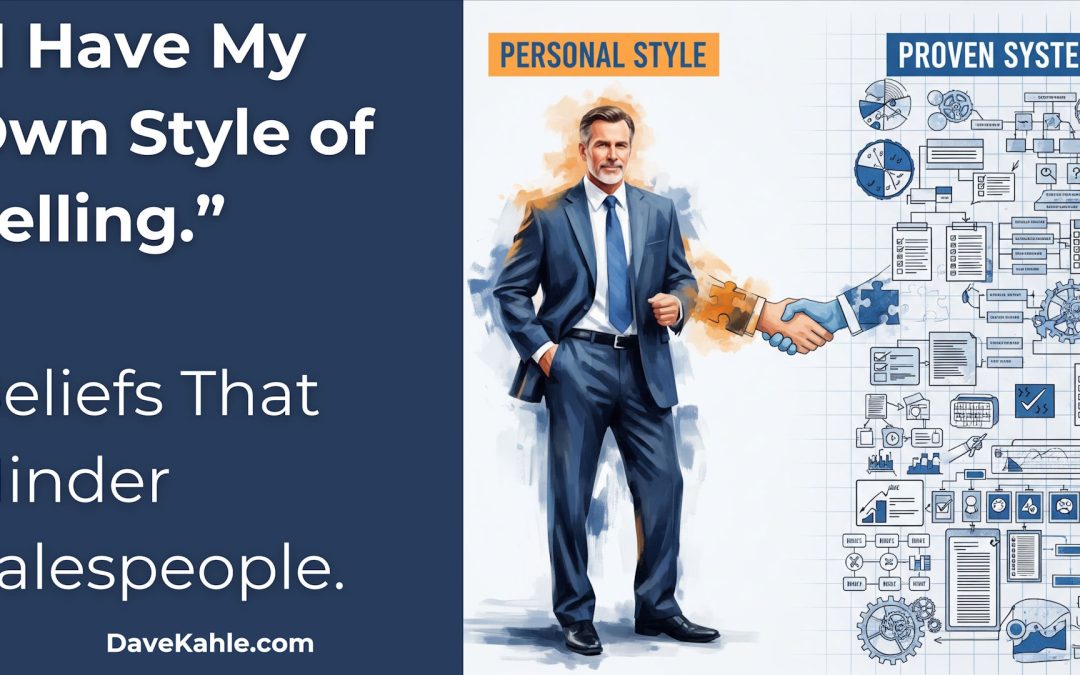Regularly, I encounter a belief that can hinder a salesperson’s performance. These beliefs often seem reasonable and are accepted without question. However, a closer examination reveals how they can significantly limit a salesperson’s capabilities.
One of the most prevalent of these limiting beliefs is: “I have my own style of selling.” This belief is particularly insidious because it allows the salesperson to avoid taking responsibility for their own improvement. Many salespeople remain stuck far below their potential due to this mindset.
Here’s why this belief is problematic:
While it is true that everyone has their unique selling style, shaped by individual knowledge, wisdom, and experiences, the issue arises when salespeople use this belief to dismiss the guidance offered by management and sales experts. The thought process often goes something like this: “Since I have my own style, I don’t need to pay attention to advise from others. They don’t understand my approach, so their insights are not relevant.”
In this way, “my style” becomes an excuse that frees the salesperson from the obligation to enhance their skills. They retreat into the comfort of their personal style, rendering them impervious to new ideas or strategies.
For instance, if a manager shares an article that inspired them, the salesperson might delete it without reading because they believe they already know better. When a noteworthy seminar comes to town, they might claim to be too busy, but the truth is they feel their style doesn’t require any new information. Similarly, when the company invests in a highly regarded book for the sales team, that book might gather dust on their shelf, as they believe it won’t provide any valuable insights. If a new product line is introduced, the salesperson might not promote it simply because it doesn’t align with their personal style. Thus, the phrase “my own style of selling” becomes a tool for evading responsibility for skill enhancement, strategic consideration, or tactical refinement.
Best Practices
In any field, some individuals demonstrate superior skills compared to others. Thoughtful and analytical practitioners identify the successful behaviors that lead to improved outcomes. These behaviors, known as “best practices,” can be mimicked by others to achieve similar or better results.
Best practices emerge in every refined human activity. As the world evolves, so does this body of knowledge, prompting dedicated professionals to regularly study and integrate best practices into their routines, thus ensuring ongoing relevance and value in their roles.
This ongoing learning process is similar across various professions; educators attend workshops, medical professionals participate in conferences, pilots undergo refresher training, and others—such as ministers, social workers, psychologists, managers, and accountants—continually seek out the latest insights in their respective fields.
To illustrate, consider the evolution of corn cultivation. Initially, people simply gathered corn, and some were naturally better gatherers than others. Those individuals may have felt proficient and developed their own styles of gathering. However, an innovative thinker eventually realized it was possible to grow corn intentionally. Through experimentation and discovery, a set of best practices emerged—such as optimal planting depths, spacing between seeds, and appropriate watering and fertilizing techniques. These best practices were adopted globally, transforming agriculture and feeding millions who would have otherwise faced starvation.
This process of continuous learning and adaptation applies to every profession. Yet, there is one notable exception: salespeople.
Despite the clear benefits of adopting best practices, many sales professionals often resist this approach.


Recent Comments